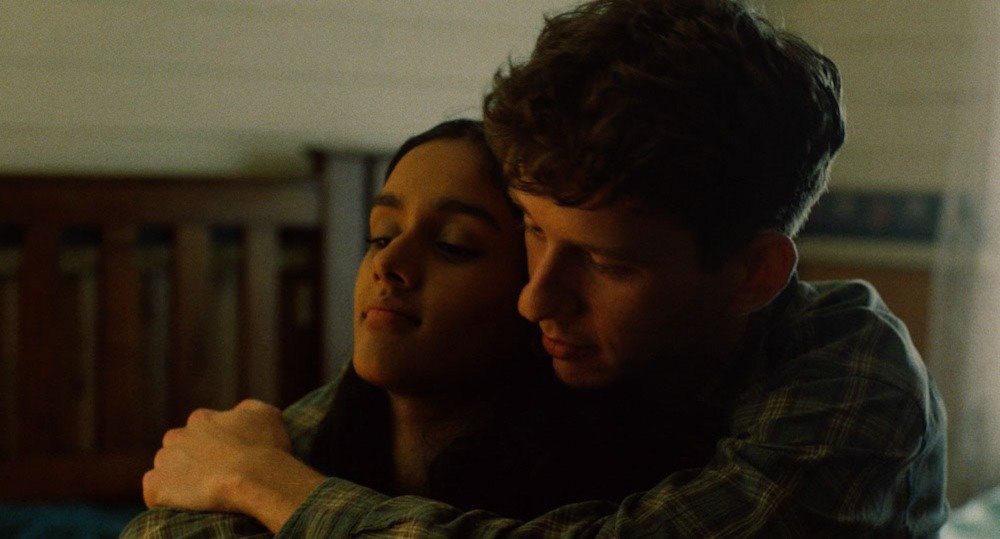This review contains mention of sexual assault, gaslighting, and toxic masculinity.
It’s no mistake that Jack Clark and Jim Weir have a visual cue in the form of a Wake in Fright poster in the background to their disturbing debut Birdeater. The sense of men regressing to their most destructive homosocial urges pervades the directors’ work where the sheen of civility is merely a cover that hides devastating truths. Instead of a teacher finding himself one beer away from conforming to the most toxic traits of masculinity, Clark and Weir give us a group of privileged North Shore Sydney private school boys who have long hidden under the umbrella of wealth and education to avoid being discovered as what they are: monstrous hypocrites and social parasites. Huge spiders who can devour small animals.
Louie (Mackenzie Fearnley) is engaged to Irene (Shabana Azeez). Inside their well-appointed Sydney apartment something is not quite right. Why is Irene so scared of being alone? Why does Louie tell her he won’t leave her but then wait until she’s in a drugged sleep to take the keys and escape the house? Why does the smallest lack of submission to Louie on Irene’s behalf lead the apparently solicitous and caring man so nervous? Clark and Weir will answer those questions, but before they do, they are going to take the audience through the hellscape that is Louie’s bachelor party/buck’s weekend on the bucolic Macdonald River.
In a move that would appear strange to most, Louie wants Irene to attend the weekend. He has invited his school friends Murph (Alfie Gledhill), Dylan (Ben Hunter), Charlie (Alfie Gledhill), and Charlie’s fiancé, Grace (Clementine Anderson) for what he hopes will be a lowkey affair where the group can reconnect and celebrate the upcoming nuptials. Alcohol is of course welcome, but Louie puts his foot down when agent of chaos, Dylan, insists on some harder substances. It’s supposed to be a pleasant dinner party but soon devolves into a bacchanalia of extremes.
Clark and Weir tease out small details. Louie it seems is lucky to be alive after a terrible accident that has left him with a head scar. Irene appears changed, the once lively university student from Britain is calm to the point of emptiness. Charlie and Grace, a conservative Christian couple have yet to have consummated their relationship and prize their virginity, while Dylan, who has just returned from some form of cultural tourism, wonders why everyone is so underwhelming and uninteresting. It’s a buck’s party and there will be excess whether people desire it or not (he’s not against spiking people’s drinks).
Silly fetish outfits and blow-up sex dolls are tolerated as part of the ritual, but it is all supposed to settle down when it comes to the dinner party in the evening. Instead, we find Grace arguing with the men about autonomy, Charlie and Murph trying to act as referees as Dylan becomes increasingly aggressive with Louie. A surprise guest, Sam (Harley Wilson) who no one seems to have invited, sets Louie off.
Dylan, in his ‘No Bad Vibes’ t-shirt seems to be the epitome of bad vibes. He initiates a game called ‘Paranoia’ where a coin toss decides whether a whispered question that is answered publicly is spoken so all can hear it. Along with a cruel dinner speech he seems to be gunning for Louie. “I love Louie. We all love Louie. We are here to say adieu to the man we once knew. Louie wanted to hide in plain sight. Charlie, Louie, Dylan. We came as three,” the speech begins and then he tells the story of how Louie and Irene met. A party on the beach (the audience sees this earlier) where Louie locks eyes with Irene. The supposed romance beginning with Louie perhaps getting Irene drunk for his own purposes. He then mentions Irene as she is now and suggests that what Louie has been doing is a three-year-long date rape. Is Louie taking advantage of Irene? Or is Irene taking advantage of Louie to keep her visa? At every point in the film someone is fighting for power over someone else and is most certainly taking advantage, and the idea of innocence is blasted off the screen.
Clark and Weir use the extremes of the buck’s party to dissect the web of relationships. Dylan, with Charlie and Murph, kidnaps Louie, force feeds him nangs and other drugs. The kangaroo shoot in Wake in Fright is the visual reference. A stripper emerges from a van. Louie “escapes” and ends up in a crashed Ute. Clark and Weir flash back to different points in Louie’s relationship with Irene and we discover that Dylan is perhaps the only person not lying to himself and other people.
Terminology like ‘gaslighting’ has become common parlance and is often misused, yet Clark and Weir show the audience exactly what gaslighting looks like. Louie tells Irene not to flash her pills around other people (she’s on a serious Benzodiazepine which Grace ingests). Charlie and Louie trie to use Grace as the buffer zone between Irene and the rest of the group, but each are lying to their partners about something essential. The irony is, that when the lies are revealed, and the truth outs, the consequences are left hanging.
Birdeater is not a horror film per se, but it is profoundly horrific. The score by Andreas Dominguez complements Roger Stonehouse’s cinematography that works to illustrate the symmetry between the characters’ psychological states and the bush landscape. Reds and greens dominate in a surreal experience that is part hallucinatory and part real.
Dylan tells Louie “Tonight, the boys own you.” However, these boys, or rather, men, have been owning people for many years through subtle and manipulative means. The men of Birdeater have been monsters long before the buck’s party and will likely remain so for long after. “You can come out on top,” Louie tells Charlie after Charlie does something he considers shameful. By dent of privilege perhaps these men will always come out on top. Even breaking them down to their venal selves teaches them they really can get away with anything. Birdeater is dark and uncompromising in its vision of masculinity unleashed; a visceral and feral experience that is outstanding.
Directors: Jack Clark, Jim Weir
Cast: Mackenzie Fearnley, Shabana Azeez, Ben Hunter
Writer: Jack Clark



